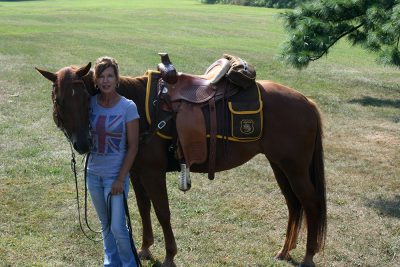
Casey, a 13-year-old Quarter Horse from Parma, Michigan, can be found donning the gold and brown saddle of Jackson County’s finest volunteers, the Jackson County Mounted Division. She’s one of the brave police horses that help with search and rescue, crowd control, security at county events, and parade duties in Jackson County. She’s a very calm, trusting, and kind horse. But she hasn’t always been suitable as an equine volunteer.
Four years ago, Casey was discovered at a horse auction by owner Tonya Fatchett’s friend. For only $250 she was able to save her from the meat buyer who was also bidding on the mare. She had Fatchett swing by her house to meet the new horse.
“When I first laid eyes on her, I fell in love with her,” said Fatchett, “I think she loved me too. She would follow me when I visited and it seemed like she wanted to connect.”
Fatchett described Casey as very playful and confident and with a knack for knowing when to show each of her traits. She said it took the horse a while to become confident around Fatchett, but their relationship really blossomed over time.
Despite her newly developed trust, Casey seemed to have a history of medical mismanagement. Dr. Denise Bickel of Whole Horse Veterinary Services in Jackson, Michigan, inspected Casey when she was first acquired by Fatchett and found a history of foundering and an impacted tooth that had to be removed.
One day, Fatchett came home from work to find Casey lying on the ground in obvious pain. She immediately called Bickel, who confirmed the horse was suffering from a bout of colic.
They decided to monitor Casey overnight and see if she felt better the next day. Casey did not improve, and upon examination, Bikel determined that Casey probably had a blockage and that her only chance of survival was to go to the MSU Veterinary Medical Center.
Once she arrived at MSU, she was greeted by MSU clinic staff. Casey was assigned to Drs. Elizabeth Carr and Annie Kullman.
Casey’s first diagnostic tests brought back bad news. Casey had a sand impaction in her intestinal tract. The clock was ticking on Casey’s life.
“The veterinarians who spoke with us were very honest. They never gave us false hope,” said Fatchett. “I really thought I was losing my best friend.”
The diagnostic tests necessary to determine the location of the impaction were expensive and it was looking more likely that Casey would have to go into surgery. At this point, Fatchett feared she could not afford further care.
Ultimately, the impaction was found in her large intestine, which was very good news for Casey. It’s much less risky to remove an impaction from the large intestine than from the small intestine. The surgery is safer, but still costly.
While the clinicians were taking actions to keep the costs as low as possible, Fatchett had to consider humane euthanasia because the mounting potential costs were beyond her finances.
Then what seemed like a miracle happened. A direct donation to Casey’s care was made by the BloomFund, allowing her to have life-saving surgery.
“I was doing everything I could to raise money,” said Fatchett, “That donation helped us reach the amount we needed for the surgery. If we didn’t have that money, she may not have had her surgery. It was such a relief.”
The surgery was a success and allowed Casey and Fatchett to reunite. One year later, Casey has made a strong recovery and is better than ever. Casey is active around her padock and goes on light trail rides with Fatchett. She is also able to continue in a volunteer role with the Jackson County Mounted Division.
“I noticed that after her surgery, everything changed for the better. Her coat changed, it became brighter. You can even see the change in her eyes. They’re bright and alert,” Fatchett said.
